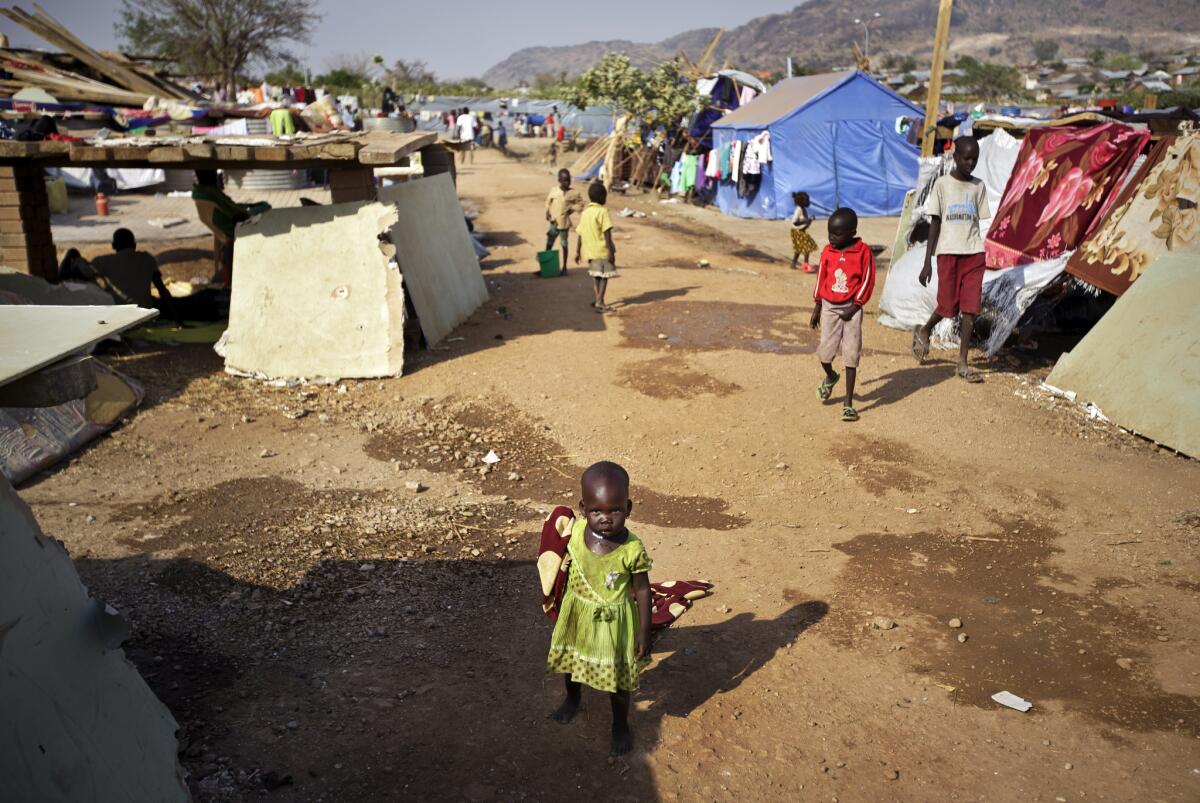South Sudan rebel leader agrees to peace talks in Ethiopia

- Share via
JOHANNESBURG, South Africa – South Sudan’s rebel leader agreed to begin talks with the government Tuesday, a tentative step toward peace though one hampered by continued fighting in the world’s newest country.
The talks are due to take place in Addis Ababa, the Ethiopian capital, and would be the first since violence broke out two weeks ago in a dispute between South Sudanese President Salva Kiir and his former deputy, Riek Machar, who was fired from his position in July.
Machar said he would send a high-level delegation to Addis Ababa for negotiations, led by Rebecca Nyandeng, the widow of former southern Sudanese rebel leader John Garang. But Machar also said he would not tell his troops to stop fighting.
On Tuesday he told reporters his forces had taken control of Bor, the geographically strategic capital of Jonglei state, and would march on toward Juba, the country’s capital about 90 miles to the south. Other reports suggested that the rebels had taken control of only part of Bor, and that fighting was ongoing.
This would be the third time Bor has changed hands in the last few weeks, having previously been captured by the rebels and then retaken by government forces.
Donald Booth, the U.S. special envoy to South Sudan, told the Associated Press that both sides agreeing to talks was “a first but very important step to achieving a cessation of hostilities.”
Despite calls by East African leaders for talks to begin by Dec. 31, and threats of military action against the rebels by Ugandan President Yoweri Museveni, Machar’s forces carried through the attack on Bor. Some observers believe Machar is seeking to strengthen his negotiating position.
A militia of thousands of young men loyal to Machar, known as the “White Army” for the light-colored ash worn on their skin, was involved in the siege.
Doctors Without Borders said about 70,000 civilians had sought refuge from the fighting in Bor by fleeing to the town of Awerial in neighboring Lakes state. Most of them were said to be women and children.
The aid group said that living conditions for these people were “verging on the catastrophic,” with no clean water, food or shelter.
More than 121,600 people in South Sudan have fled their homes since violence erupted Dec. 15, and thousands are feared dead, according to the United Nations, though the numbers are probably far higher.
The U.N. mission in South Sudan on Tuesday said it was “gravely concerned” by evidence of serious human rights violations since the conflict began.
“I condemn in the strongest possible terms the atrocities committed against innocent civilians of different communities by elements from both sides during the crisis,” Hilde Johnson, the U.N.’s special envoy to South Sudan, said in a statement. “There is no excuse for these terrible acts of violence.”
The statement said that extrajudicial killings of civilians and captured soldiers have occurred around the country, “as evidenced by the discovery of large numbers of bodies.”
“Many of these violations appear to be ethnically targeted,” it said. “Most of the more brutal atrocities are reported to have been carried out by people wearing uniform.”
Conway-Smith is a special correspondent.
More to Read
Sign up for Essential California
The most important California stories and recommendations in your inbox every morning.
You may occasionally receive promotional content from the Los Angeles Times.









